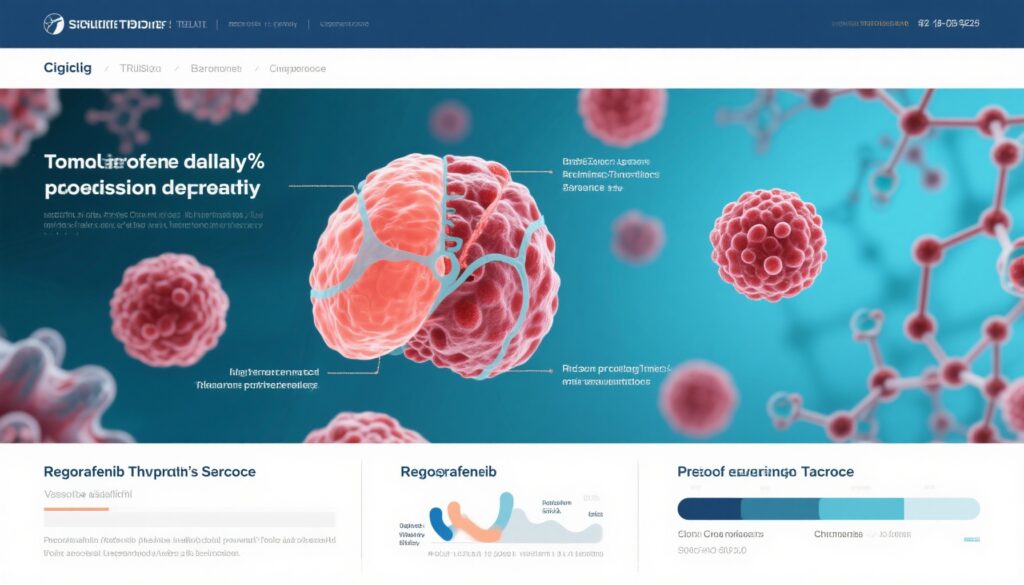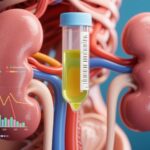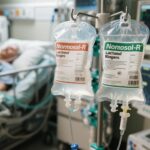Highlight
- Regorafenib as maintenance therapy significantly extends progression-free survival (5.6 vs 3.5 months) after doxorubicin-based chemotherapy in advanced non-adipocytic soft tissue sarcoma (STS) patients.
- The phase II EREMISS trial enrolled 126 patients with predominantly leiomyosarcoma, demonstrating a favorable hazard ratio (HR=0.53) for progression-free survival.
- Overall survival improvement showed a positive trend but was not statistically significant (27.6 vs 20.5 months; HR=0.78; P=0.28).
- Toxicity was considerable with regorafenib, with over half experiencing grade ≥3 adverse events; common severe side effects included asthenia, hypertension, and rash.
Study Background and Disease Burden
Soft tissue sarcomas (STS) represent a heterogeneous group of mesenchymal malignancies with more than 50 histological subtypes. Non-adipocytic STS, including leiomyosarcoma, constitute a significant clinical challenge, especially in advanced stages where curative options are limited. Standard first-line systemic therapy typically involves doxorubicin-based chemotherapy; however, after initial cycles, disease control is often short-lived, and no established maintenance treatment exists. Maintenance therapy aims to delay progression and improve survival with acceptable toxicity. Regorafenib, a multikinase inhibitor targeting angiogenic, stromal, and oncogenic kinases, has demonstrated activity in other sarcoma subtypes, but its role as maintenance therapy post-chemotherapy needed clinical evaluation. The EREMISS trial investigates whether continuing regorafenib after achieving stable disease or partial response with first-line chemotherapy can improve outcomes in advanced non-adipocytic STS patients.
Study Design
The EREMISS (NCT03793361) was a multicenter, randomized, double-blind, placebo-controlled phase II trial conducted between May 2019 and November 2022 across 17 centers in France. Eligible patients had histologically confirmed advanced non-adipocytic STS with stable disease or partial response following six cycles of doxorubicin-based chemotherapy. Patients were randomized 1:1 to receive either regorafenib (120 mg/day, 3 weeks on, 1 week off) or placebo as maintenance therapy.
Primary endpoint was progression-free survival (PFS) per RECIST 1.1 criteria, centrally and blindly reviewed. The study assumed PFS for placebo of 4 months and targeted improvement to 7 months with regorafenib. A total of 126 patients were enrolled, requiring 110 progression events to provide an 80% power and a one-sided alpha of 0.05.
Secondary endpoints included overall survival (OS), safety, and tolerability.
Key Findings
The trial enrolled 126 patients, of whom 55% were female, with a median age of 58 years (range 18–85). Leiomyosarcoma was the predominant histological subtype (59%), reflecting the spectrum of non-adipocytic sarcomas.
Efficacy:
Median PFS was significantly improved with regorafenib at 5.6 months compared to 3.5 months in the placebo group (hazard ratio [HR] 0.53; 95% confidence interval [CI], 0.36–0.78; P=0.001). The benefit was consistent across subgroups including histology and prior response status.
Median OS showed an encouraging but non-significant trend favoring regorafenib (27.6 months vs 20.5 months; HR 0.78; 95% CI, 0.50–1.22; P=0.28), potentially influenced by cross-over or subsequent therapies.
Safety:
Regorafenib was associated with significantly higher toxicity. Grade ≥3 adverse events occurred in 56.3% of patients in the regorafenib arm versus 4.8% in placebo. The most common severe toxicities were asthenia (9%), arterial hypertension (8%), and rash (8%). These adverse events were manageable with dose modifications and supportive care but require careful monitoring.
Overall, regorafenib achieved the primary objective of delaying progression with an acceptable safety profile in this patient population.
Expert Commentary
The EREMISS trial represents a milestone in management strategies for advanced non-adipocytic STS, addressing the unmet need for maintenance therapy post-chemotherapy. The significant PFS benefit suggests that targeting kinase pathways with regorafenib can suppress residual disease activity and improve disease control duration.
While the OS result did not reach statistical significance, the trend is promising and may reflect the limited power or effects of post-progression treatments. The toxicity profile aligns with known adverse effects of regorafenib and stresses the importance of individualized dose adjustments.
Clinical guidelines have yet to incorporate maintenance therapy in STS, but this study provides evidence to consider regorafenib for suitable patients, especially those with leiomyosarcoma who tolerated first-line chemotherapy well. Additional research may clarify long-term survival benefits and optimal patient selection.
Comparison with other agents such as pazopanib or trial results in adipocytic sarcomas would further inform therapeutic sequencing in STS.
Conclusion
Regorafenib as maintenance therapy after first-line doxorubicin-based chemotherapy in advanced non-adipocytic soft tissue sarcoma significantly delays disease progression with a clinically meaningful progression-free survival benefit. Although overall survival improvement was not statistically confirmed, the safety profile is consistent with prior experience, suggesting that regorafenib is a viable maintenance option in this challenging setting. Further studies and longer follow-up may elucidate the full impact on survival and quality of life.
References
Penel N, Italiano A, Wallet J, Chaigneau L, Verret B, Firmin N, Watson S, Valentin T, Bompas E, Bertucci F, Brahmi M, Henon C, Brunot A, Spalato-Ceruso M, Vanseymortier M, Heyman-Decoupigny E, Ryckewaert T, Le Deley MC, Perrin C, Blay JY. Regorafenib as maintenance therapy after first-line doxorubicin-based chemotherapy in advanced non-adipocytic soft tissue sarcomas patients: a double-blind randomised trial. Ann Oncol. 2025 Aug;36(8):944-953. doi: 10.1016/j.annonc.2025.03.024. Epub 2025 Apr 8. PMID: 40210087.



